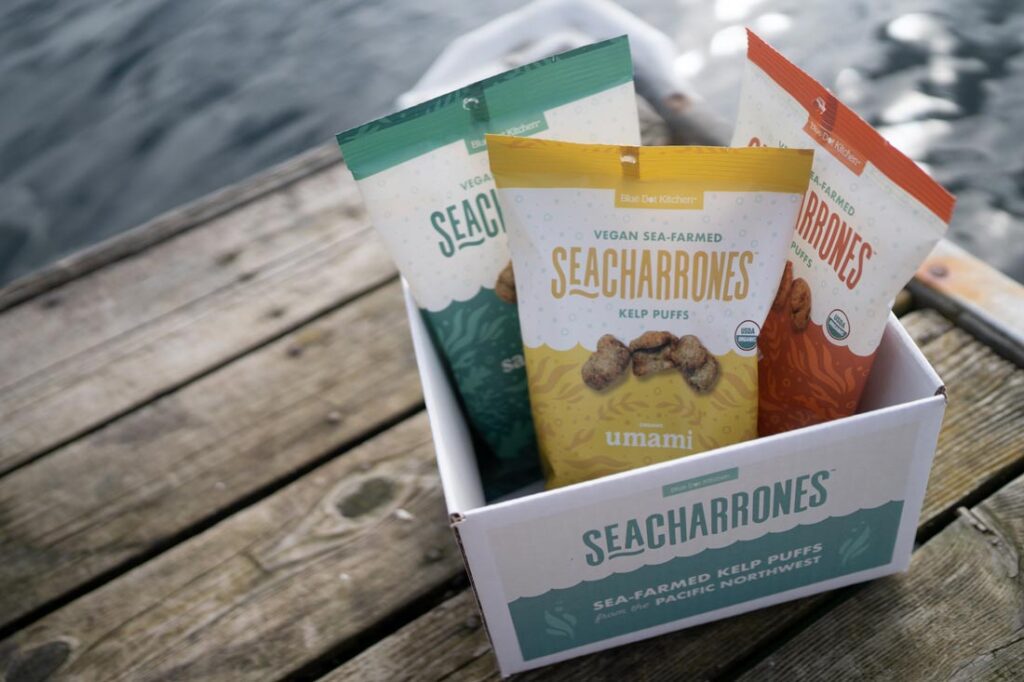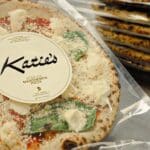It’s a cold, overcast day in March when I climb a narrow ladder onto a small boat docked in Port Gamble, on Washington’s majestic Olympic Peninsula. The rain threatens to make an appearance, but my fellow seaweed-obsessed boatmates and I are outfitted in our best Pacific Northwest-appropriate gear, ready for the adventure before us.
As the engine whirs, the lyrics from Joni Mitchell’s Big Yellow Taxi—“You don’t know what you’ve got / Till it’s gone,”—play on repeat in my head as I reflect on the loss of my connection to the sea upon moving back to the Midwest after 14 years in Seattle.
Mostly, though, I think about how we will all lose the sea if we don’t roll up our sleeves and figure out how to save it. And thanks to a new crop of food innovators, kelp might just be the superhero superfood we’ve been looking for.
Kelp: a new conservation hero?
When pollution and chemicals from the air and land leach into the sea, it acidifies the water, destroying plant life and ocean ecosystems. Kelp reduces ocean acidification by absorbing carbon. There’s even the potential to use kelp to transfer carbon from the sea to the land, where it produces nutrient-rich soil amendments. But perhaps one of the biggest benefits is that kelp doesn’t require land, pesticides, fertilizers or additional water to grow.
My sea mate Jon Kroman knows this all too well. As co-founder of Blue Dot Sea Farms (BDSF)—Washington’s only commercial kelp farm—he and his colleagues are at the forefront of research in this space. They use their five-acre farm on Hood Canal, a saltwater fjord nestled between Puget Sound and the Olympic Mountains, as an underwater laboratory.
As the boat picks up speed, I blink cold tears while taking in the snow-capped peaks of the Cascade Mountains, seagulls arcing overhead and the occasional seal head bobbing along the surface of the water. When we approach our destination, a team of rubber-clad farmers wave to us from a boat outfitted with the coolest conveyer belt I’ve ever seen. They’re slicing shimmering ribbons of sugar kelp with tiny knives, which cascade like a waterfall from the quick-moving belt into big black tubs.
Travis Bettinson, a chef and recipe developer who joined with the BDSF team in founding the retail arm, Blue Dot Kitchen, hands me a bag of Korean BBQ-flavored Seacharrones, a pork rind-like snack made of kelp he brought to market in March. They’re light and airy, with a melt-in-your-mouth finish that reminds me of a briny Cheeto.
A booming commercial industry
In the U.S., kelp-based food businesses are growing as fast as the seaweed they’re working to cultivate. It’s just a few drops in the ocean compared with the global commercial seaweed market, which is “projected to grow from $15.01 billion in 2021 to $24.92 billion in 2028,” according to a Fortune Business Insights report. China leads the way in aquaculture production, followed by Indonesia and South Korea.
“Seaweed farmers [in the U.S.] didn’t have markets to sell into because there weren’t companies to buy this product and use it at the scale everyone wanted to see,” Bettinson says. “With the growth of farms who are really driving the amount of seaweed provided, it’s just turning the corner [to become] a good industry here.”
Making kelp food mainstream
One of the longest-running kelp-reneurs is Atlantic Sea Farms, which launched in 2009 in Maine as the first commercially viable seaweed farm in the United States. They work with local fishing communities to help farmers start their own kelp farms, and sell frozen wild blueberry and ginger kelp cubes, sea vegetable kimchi (sea-chi) and sea-veggie burgers in supermarket frozen food sections across the country.
Barnacle Foods in Alaska makes bull-kelp hot sauce, kelp pickles and everything bagel kelp seasoning with kelp that is both wild harvested and sourced from a variety of farmers. They also partner with Chef Taku of Outdoor Chef Life to make their kelp chili crisp, use Alaskan Brewing Company’s Alaskan Amber beer in their kelp BBQ sauce and partner with Alaska’s Chugach Chocolates to create a chocolate bar using dried bull-kelp fronds and cayenne pepper.
Alaska-based Seagrove Kelp sells frozen ribbon kelp (also known as wakame) across Alaska and Washington, and provides kelp to companies such as Foraged & Found, which uses their kelp—along with kelp from other commercial fishermen—to make their salsa and pickles, and Daybreak Seaweed Co., which creates seaweed salt and chipotle seaweed flakes using their wakame, along with kelp from Alaska Shellfish Farms.
AKUA, which sources kelp from Maine farmers—a large percentage of which comes from female-owned Summit Point Seafood—launched a Kickstarter campaign in 2018 to bring their kelp jerky to market, raising more than $71,000. In 2021, they raised over $1 million in a campaign to bring the world’s first kelp burger to market. The patty is now sold online and in over 800 grocery stores and 30 restaurants across the U.S.
Making waves in the plant-based market
Also claiming ownership of the world’s first kelp-based vegan krab cakes and ground meat, AKUA is attracting celebrities and TV networks as partners. The company’s kelp ground meat is served at the Butcher’s Daughter New York and Los Angeles locations; the Local Burger Co. in New York’s Bay Shore location; The Standard Hotel in Miami; and two of celebrity chef Tom Colicchio’s restaurants, Small Batch in Long Island and Vallata in Manhattan. And this summer, AKUA is unveiling its SpongeBob Kelp Patties and BBQ Kelp Patties in partnership with Nickelodeon.
“Our food systems are so messed up and it starts with what we’re feeding our children,” Co-founder Courtney Boyd Myers says. “The foods marketed toward kids are full of processed fats and sugar. Nickelodeon reached out to us because the founder of SpongeBob was a lifelong vegan and ocean conservationist, and they were looking for brands to be a part of their marketing initiative, Operation Sea Change. In the show, SpongeBob makes a Krabby Patty, which is essentially a kelp burger. So since we launched the kelp burger, people are like, ‘This is so SpongeBob, and it’s a Krabby Patty.’ So now we can just lean into that and do it in a really fun way.”
With plans for kelp meatballs, breakfast sausage and a revival of their discontinued kelp jerky, it’s no surprise that AKUA’s sales figures are as impressive as their product line.
“We’ve been moving from building a national online business to a national retail and food service business,” Boyd Myers says. “According to [retail data analysis firm] Spins, in the last 52 weeks, we’re the second fastest growing plant-based food brand.”
Large-scale change starts small
So whether it’s kelp chocolate, chili crisp, puffed snacks or SpongeBob kelp sliders, it’s clear the tides are shifting when it comes to making kelp food an addictive category in the plant-based market.
As I look down at the bag of Seacharrones in my hands, and then out at the water, I don’t need convincing that large-scale change—whether saving the oceans or changing eating habits—almost always starts with something small. Bettinson beams when he talks about the future of his company, excited about the ripple he has already created.
“We wanted to create a product that would have a lot of impact, and get seaweed in the mainstream aisle of the grocery store,” he says. “We just want to get seaweed to the people.”
Photo by Justin Huguet











